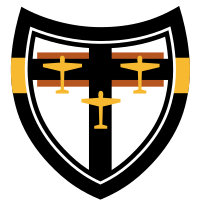| Jagdgeschwader 27 | |
|---|---|
 | |
| Active | 1 October 1939 – 8 May 1945 |
| Country | |
| Branch | Luftwaffe |
| Type | Fighter Aircraft |
| Role | Air superiority Escort fighter Surgical strike Maritime interdiction |
| Size | Air Force Wing |
| Nickname(s) | Afrika |
| Commanders | |
| Notable commanders | Eduard Neumann |
| Aircraft flown | |
| Fighter | Bf 109 |
Jagdgeschwader 27 (JG 27) "Afrika" was a fighter wing of the Luftwaffe during World War II. The wing was given the name "Africa" for serving in the North African Campaign predominantly alone in the period from April 1941 to September 1942. Elements of JG 27 fought in every major theatre of operations in which the Wehrmacht operated.
Stab JG 27 was created in October 1939 and assigned two gruppen (groups) in the Phoney War. The wing's first campaign was Fall Gelb, the battles of the Low Countries and France. In the second half of 1940 JG 27 received a third gruppe and fought in the Battle of Britain. In 1941 it returned to Germany then fought in the German invasion of Yugoslavia and Battle of Greece in April 1941. The wing was then separated with two gruppen sent to support Operation Barbarossa, the invasion of the Soviet Union in June 1941. I. Gruppe was sent to Italian Libya beginning JG 27s North African Campaign from mid-April 1941. It was joined by II. Gruppe which was withdrawn from the Eastern Front after less than two weeks and transferred to Africa. III. Gruppe joined the other gruppen in North Africa in late 1941. JG 27 fought as a complete wing in Africa and Battle of the Mediterranean, supporting the Siege of Malta, until December 1942. I. Gruppe returned to France and spent the rest of the war serving in the Defence of the Reich, Channel Front, and Western Front theatres. III. and the newly created IV. Gruppe remained operating in Yugoslavia and Greece until March 1944.
In the final year of the war JG 27 fought the Normandy landings in June 1944 and supported the last major German offensive in the West in December. As the Ardennes Offensive failed, it took part in the disastrous Operation Bodenplatte on 1 January 1945. For the remaining months of the war it separated again, with elements surrendering to the British in northern Germany while the bulk surrendered to the Americans in Austria, on 8 May 1945.